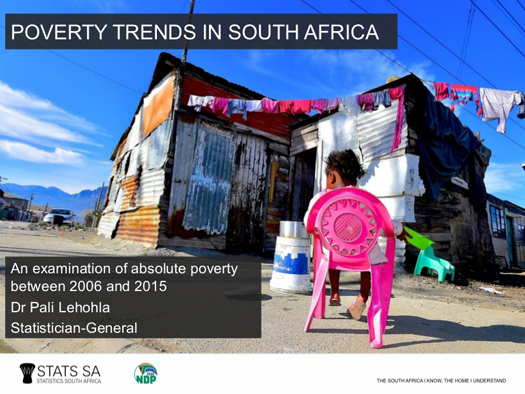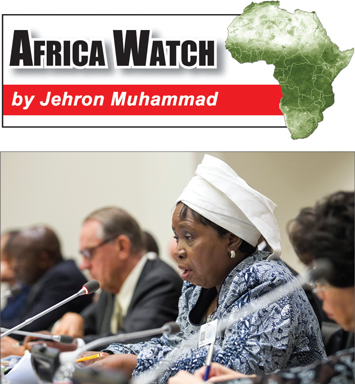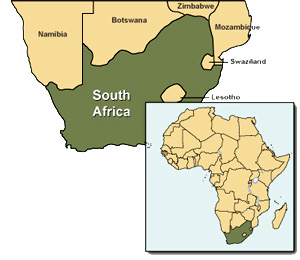Post-apartheid South Africa
By Jehron Muhammad -Contributing Writer- | Last updated: Sep 14, 2017 - 7:58:57 AMWhat's your opinion on this article?

|
During a recent speech delivered at the Gordon Institute of Business Science in Johannesburg, South Africa, the former chair of the African Union, Dr. Nkosazana Dlamina Zuma said, the fact that the post-apartheid “non-racial democratic vote” was a great achievement and victory, the liberation struggle was “never” just about the right to vote.
“It has always … been about economic liberation of all South Africans—but especially about economic justice for the Black majority,” she said. Dr. Dlamina Zuma, who is campaigning for the presidency of the African National Congress (ANC), and whose campaign slogan is “Radical Economic Transformation, now or never!” made it clear, that “economic justice” has yet to be achieved. She said, “We still live in a deeply unequal society, where the fault-lines of that inequality are primarily defined by race.”

Nkosazana Dlamini-Zuma, former chairperson of the African Union Commission, addresses a high-level meeting on the Response to the Ebola virus disease outbreak Sept. 25, 2014, at the United Nations, New York. Photo: UN Photo/Rick Bajornas
|
Post-apartheid South Africa is failing the very people it says it liberated, a new study suggests. The study, published by the national data agency Statistics South Africa, and titled, “Poverty trends in South Africa: An examination of absolute poverty between 2006 and 2015,” revealed a startling increase in poverty rates for post-apartheid Black South Africa.
According to the study, Black South Africans are the worst affected by rising poverty, with half the population listed below Statistics South Africa’s lower-bound line of poverty, defined as “individuals who have to sacrifice buying food for other essentials.” Less than one percent of White South Africans are below this poverty line.
In addition, primarily Black youth find themselves trapped in poverty from birth, with 43.5 percent under the age of 17 living in households that earn below the medium income of $60 per month.
A major concern that is widely discussed is the government’s inability to “implement” its own policies. The launch in 2012 of the “National Development Plan” with much fanfare, but little “political will,” as reported in Quartz Africa, “left the plan adrift.” The government’s goals, including a plan to reduce poverty from 39 percent in 2009 to zero percent by 2030 and eliminate hunger, is nowhere near being implemented.

|
The blame obviously falls at the feet of the ruling ANC, which, since 1994, has pursued several parallel goals, including emphasizing equity and redistribution of wealth, while also advocating rapid economic growth and corporate investment. The corporate investment goal, as top priority, obviously cancels out the redistribution of wealth.
A case in point is the Black Economic Empowerment or BEE policies. The ANC has pursued a “cautious” leadership style in implementing BEE according to published reports, “because it has benefited mainly politically-connected individuals rather than the mass of the previously disadvantaged, and partly because South Africa’s corporate sector continues to be dominated—managed and owned—by the minority Whites.”
The ANC run government has cooperated with corporate capital, since members received training at Goldman Saks back in the mid-1990s, and set empowerment targets acceptable to local industry and foreign companies.
Delivering the prestigious annual Nelson Mandela lecture in Soweto in 2015, at the University of Johannesburg, economist, Thomas Piketty said that income inequality in South Africa, in many cases, is higher today than 20 years ago. During his speech the French national confessed that South Africa presented him and his fellow economists with a “conundrum,” and outlined why the country is so dramatically unequal, and suggested a few things that could be done.
“Of course, now we are 25 years after the fall of apartheid,” the author of the 2014 bestselling book, “Capital in the 21st Century,” said, “(but) inequality is not only still very high in South Africa, but has been rising and in some ways income inequality is even higher today than 20 years ago.”
He argues that capitalism today is fundamentally flawed wealth and will always grow faster than economic output. In other words, the rich get richer and the poor get poorer.
Piketty called for a national minimum wage and argued for worker participation at the board level in companies, and he said, South Africa desperately needed a proper land reform.
“If we take a broad international historical perspective, we see in many countries, in history, much more ambitious land reforms than what we have seen in South Africa since the end of apartheid. I think it’s fair to say that Black economic empowerment (BEE) strategies, which were mostly based on voluntary market transactions were not that successful in spreading wealth. So, I think we need to think again about more ambitious land reform,” he said.
To say Piketty’s radical suggestions didn’t sit well with the event’s corporate sponsors, which included AngloGoldAshanti, Audi, Coca-Cola South African, Vodacom and Rupert & Rothschild Vignerons (wine producer) is an understatement. He did receive several standing ovations from the audience.
Dlamini Zuma, during her speech said, “The South Africa that we want is summarized in the (June 26, 1955) Freedom Charter, which is our democratic South Africa’s foundational document. With the current exploitative and unequal economic status quo in mind the Freedom Charter necessarily and realistically calls for profound economic changes. It calls for radical agrarian reform to restore the land to our people, the wide spread restructuring of our financial institutions such as the big banks and insurance industry and where necessary nationalization of key industries with the specific intention to fundamentally change the power dynamics in our economy in favor of the Black majority, and to break the grip of White monopoly capital on the main economic centers.”
Whether this is just campaign rhetoric coming from the mouth of President Jacob Zumas former wife, only time will tell.
Jehron Muhammad is a Final Call contributing writer. Follow him on Twitter @JehronMuhammad
INSIDE STORIES AND REVIEWS
-
-
About Harriett ... and the Negro Hollywood Road Show
By Rabiah Muhammad, Guest Columnist » Full Story -
Skepticism greets Jay-Z, NFL talk of inspiring change
By Bryan 18X Crawford and Richard B. Muhammad The Final Call Newspaper @TheFinalCall » Full Story -
The painful problem of Black girls and suicide
By Charlene Muhammad -National Correspondent- » Full Story -
Exploitation of Innocence - Report: Perceptions, policies hurting Black girls
By Charlene Muhammad -National Correspondent- » Full Story -
Big Ballin: Big ideas fuel a father’s Big Baller Brand and brash business sense
By Bryan Crawford -Contributing Writer- » Full Story






 Click Here Stay Connected!
Click Here Stay Connected!








